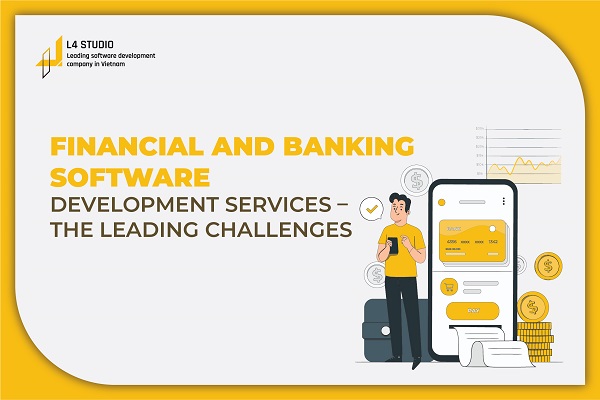
FINANCIAL AND BANKING SOFTWARE DEVELOPMENT SERVICES – THE LEADING CHALLENGES
In the current era of digitization, the financial and banking sector is undergoing a rapid transformation. The traditional banking system has become obsolete, and the digital banking system is taking over the industry. However, with this transformation, come various challenges that financial and banking institutions face while developing software solutions. These challenges range from ensuring data privacy to adhering to regulatory compliance requirements. Comprehensive knowledge of software development and a deep understanding of financial and banking domains are imperative to address associated challenges. This is where financial and banking software development services come into play. These services help institutions to build customized software solutions that are secure, scalable, and in compliance with regulatory requirements.
The article provides information on challenges faced by financial and banking institutions in software development and their solutions. This article will help you comprehend the complexities in financial and banking software development and ways to overcome them. So, let’s dive into the world of financial and banking software development services.
What are software development services?
With the rising demand for customized software solutions, software development services have become increasingly crucial for individuals and businesses. The process of software development services involves a range of complex procedures, including planning, analysis, design, development, testing, and deployment. These procedures ensure the software or application developed is tailored to meet the specific needs and requirements of the client.
The software development process starts with identifying client requirements and objectives, followed by creating a roadmap to achieve them. The analysis phase involves a detailed analysis of the project requirements and the identification of potential challenges and risks. Once the planning and analysis phases are complete, the design phase begins, where the software’s user interface, functionality, and features are designed.
Other functions involved in software development services include development, testing, and deployment. In the development phase, the software or application is built, and in the testing phase, it is tested for functionality, performance, and user experience. After deployment or launch, the software receives support and maintenance services to ensure it meets the client’s ongoing requirements.

Figure 1. An example of financial and banking software development
What are financial and banking software development services?
Financial and banking software development services are crucial for businesses to efficiently manage their economic activities in today’s fast-paced business world. These services provide customized system software that enables businesses to record, track, and manage their financial transactions effectively.
Financial and banking software development services create unique app software customized to meet the specific needs of each business organization. It enables businesses to automate their financial operations, including account management, payment processing, payroll, and billing.
Financial and banking software development services use cutting-edge technology to develop software that’s secure, scalable, and meets regulatory compliance requirements. Collaborating with clients, financial and banking software development services offer customized solutions streamlining financial processes, reducing errors, and improving productivity.
In summary, financial and banking software development services are essential for businesses to manage their financial operations effectively. Their unique app software solutions enable businesses to automate financial processes, reduce errors, and improve overall efficiency. With financial and banking software development services’ assistance, businesses can concentrate on their core operations and attain their objectives efficiently.
View more HOW FINANCIAL SERVICES CAN MANAGE CUSTOMER EXPERIENCE BETTER IN THE DIGITAL AGE?

Figure 2. A link from financial software systems to cutting-edge gadgets
Top prevalent challenges of financial and banking software development services

Figure 3. Challenges of financial and banking development services
1. Cyber security risks
In today’s world of technology, cybersecurity threats have become a major concern for financial institutions. Ensuring the security of clients’ sensitive data is crucial, as financial institutions are often the prime targets of hacking actions. Cybercriminals are continuously finding new ways to breach security systems and gain access to sensitive data.
For financial institutions, tackling cybersecurity threats is a daunting task. It requires a comprehensive feedback strategy to ensure the IT infrastructure and client data are secure and protected from disruptions. Financial institutions must implement measures to safeguard their systems and networks, including firewalls, intrusion detection systems, and antivirus software.
Additionally, financial institutions must invest in cybersecurity training for their employees to promote awareness and understanding of cybersecurity threats. They must also implement strict security protocols for accessing and handling sensitive data to minimize the risk of unauthorized access.
Cybersecurity threats pose a significant risk to financial institutions and their clients. Financial institutions must take proactive steps to secure their IT infrastructure and protect their clients’ data. Financial institutions can safeguard their systems and networks against disruptions by adopting stringent security protocols and investing in cybersecurity training.
2. Cloud Adoption
The financial services industry has traditionally relied on on-premises systems to manage its operations. However, with the pandemic boosting digitization and the better economic landscape, there is a significant shift toward cloud app modernization. This transition is not only cost-effective but also offers scalability, flexibility, and agility to financial institutions.
With cloud app modernization, financial institutions can leverage cloud computing’s power to enhance their operations and improve their customer experience. Cloud-based solutions allow financial institutions to access real-time data, streamline their processes, and make data-driven decisions.
Cloud app modernization is vital as legacy apps can’t compete with modern systems running on cloud and microservices infrastructure. Modern systems are designed to provide better functionality, scalability, and agility. Therefore, financial institutions must modernize their applications to keep up with the changing landscape of the financial services industry.
In summary, cloud app modernization is a crucial step for financial institutions to take advantage of the benefits of cloud computing, such as scalability, flexibility, and agility. With modernized applications, financial institutions can streamline their operations, and enhance their customer experience in the evolving financial services industry.
3. Legacy systems
Financial institutions and investment agencies often rely on legacy systems like central business apps for their daily operations. However, these systems pose a significant risk to the security of financial institutions, making them vulnerable to data breach activities. Legacy systems are often outdated and lack the necessary security features to protect against modern cyber threats.
Software development organizations understand that it may not be practical for financial institutions and investment agencies to replace or optimize their systems continuously. Therefore, a gradual transformation can be implemented to ensure business continuity without disruption. One approach is to operate on-premises and cloud, which allows for the benefits of cloud computing without sacrificing the security and control of on-premises systems.
Moreover, software development organizations can work with financial institutions to develop customized solutions that meet their specific needs and ensure compliance with regulatory requirements. These solutions can help financial institutions to modernize their legacy systems gradually, minimizing disruption while enhancing their security.
In summary, financial institutions and investment agencies face significant risks from legacy systems, but a gradual transformation can be implemented to ensure business continuity without disruption. Software development organizations can provide customized solutions that meet the specific needs of financial institutions, helping them to modernize their operations while enhancing their security and compliance with regulatory requirements.
4. Big Data
The adoption of AI and Big Data in financial institutions can offer significant benefits, but it also poses potential challenges. One of the major challenges is the difficulty of identifying the correct domain specialists within the organization. Different fields such as compliance, engineering stacks, and data sources require skilled experts to provide context-specific information.
Therefore, when adopting AI and Big Data in financial software applications, it is crucial to obtain domain expertise. This ensures that the right people with the necessary skills and knowledge are involved in the process. Additionally, financial and investment applications may require the expertise of leading AI solution development corporations to achieve the desired results.
Adopting AI and Big Data in financial institutions can help to improve decision-making, enhance risk management, and increase operational efficiency. These technologies enable financial institutions to process vast amounts of data quickly and accurately, providing insights that can inform business strategies and operations.
In conclusion, the adoption of AI and Big Data in financial institutions can bring considerable benefits, but it requires domain expertise and a skilled team to ensure success. Partnering with top AI solution development companies can help financial institutions harness the full potential of these technologies and attain their objectives.
Final words
In conclusion, software development in the financial field presents both challenges and opportunities. The shift towards cloud-based systems and the need to modernize legacy applications can be complex and require careful consideration. However, leveraging cutting-edge technologies like AI and Big Data can lead to improvements in decision-making, risk management, and operational efficiency.
To successfully navigate these challenges, it is essential to have the right tools and expertise in place. Financial institutions can collaborate with leading software development companies to ensure they have the necessary domain expertise and technical capabilities to execute their digital strategies effectively.
Ultimately, the financial industry must remain agile and adaptable to changes and challenges in the software development landscape. Adopting new technologies and best practices enables financial institutions to innovate, enhance customer experiences and remain competitive in a fast-changing digital landscape.
View more WHAT CAN FINANCIAL SOFTWARE DEVELOPMENT SERVICES AND SOLUTIONS DO?
Sources: Internet
——————————
L4 STUDIO – LEADING SOFTWARE DEVELOPMENT COMPANY IN VIETNAM
Website: https://l4studio.net/
Email: hi@l4studio.net
Phone: (+84) 28 6675 6685
Our Mobile App Development Services: https://l4studio.net/mobile-app-development/
For more interesting blogs: https://l4studio.net/it-knowledge/
Follow us at: https://www.facebook.com/L4Studiovn/
Read more: FINANCIAL SOFTWARE DEVELOPMENT COMPANY – EVERYTHING YOU SHOULD KNOW








